I’ve been giving quite a bit of writing advice in this blog. But today, you’re going to hear directly from the masters. I’ve compiled what I think is the best writing advice for English learners from famous writers. Notice how similar their advice is. Do great minds think alike?
#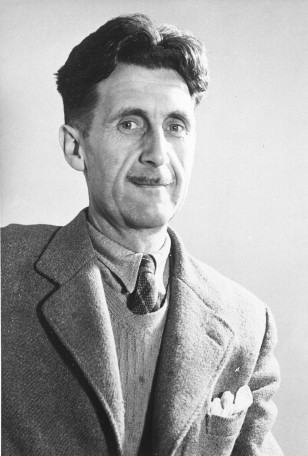 1. “If it is possible to cut a word out, always cut it out.” — George Orwell
1. “If it is possible to cut a word out, always cut it out.” — George Orwell
George Orwell (1903-1950) was an English novelist, essayist, journalist, and critic. He is best known for his dystopian novels Animal Farm and 1984, two of the most influential novels of the twentieth century. Orwell touches on one of the secrets of good writing in English: use as few words as possible. A lot of students think that complex, flowery language is a sign of sophistication. It’s not.
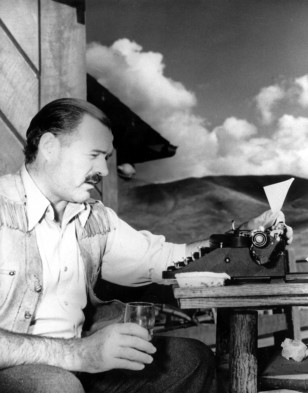 #2. “There is nothing to writing. All you do is sit down at a typewriter and bleed.” — Ernest Hemingway.
#2. “There is nothing to writing. All you do is sit down at a typewriter and bleed.” — Ernest Hemingway.
Ernest Hemingway (1899-1961) was an American author and journalist. He is known for his simple, understated writing style. He is one of the most famous American writers of the 20th century and is known for works like A Farewell to Arms and The Old Man and the Sea. Hemingway is talking about how great writers suffer for their art. Hemingway suffered from severe depression and alcoholism. He killed himself in 1961.
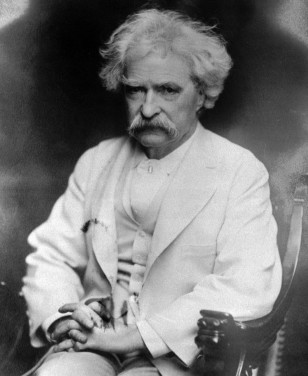 #3. “Use plain, simple language, short words and brief sentences. That is the way to write English–it is the modern way and the best way.” — Mark Twain
#3. “Use plain, simple language, short words and brief sentences. That is the way to write English–it is the modern way and the best way.” — Mark Twain
Mark Twain (1835-1910) was an American writer, humorist, and adventurer known for his witty, humorous style. His most famous works are Tom Sawyer and Huckleberry Finn. He had no patience for the flowery, romantic writing style that was popular in his time.
 #4. “Work on a computer that is disconnected from the Internet.” — Zadie Smith
#4. “Work on a computer that is disconnected from the Internet.” — Zadie Smith
Zadie Smith (1975- ) was born to an English father and a Jamaican mother. She rose to fame with her first novel White Teeth, published when she was just 22 years old. She has since published three more novels, all of which have received high critical praise. Obviously, Smith’s advice needs no explanation.
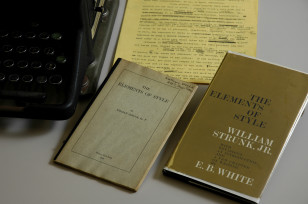 #5. “Use the active voice. The active voice is usually more direct and vigorous than the passive.” — E.B. White
#5. “Use the active voice. The active voice is usually more direct and vigorous than the passive.” — E.B. White
E.B. White (1899-1985) co-wrote, The Elements of Style, perhaps the most famous writing guide ever published. You can download the guide for free here. He also wrote the beloved children’s story Charlotte’s Web. White is talking about the weakness of the passive voice and how writers should avoid it. For example “I love you” (active voice) sound much more direct than “You are loved by me” (passive voice). You should avoid the passive voice unless you want to avoid mentioning who took the action.
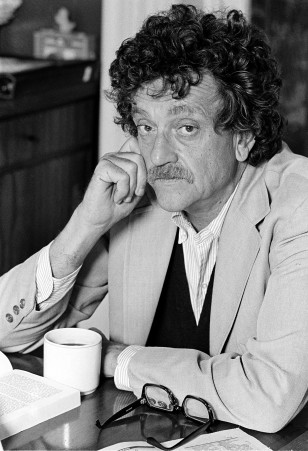 #6. “Start as close to the end as possible.” — Kurt Vonnegut
#6. “Start as close to the end as possible.” — Kurt Vonnegut
Kurt Vonnegut (1922-2007) was an American writer known for blending satire and science fiction. Among his best-known novels are Slaughterhouse Five and Breakfast of Champions. What Vonnegut means here is that good writing is concise. Your writing should be as short as possible without cutting important information.
 #7. “What I try to do is write. I may write for two weeks ‘the cat sat on the mat, that is that, not a rat,’…. And it might be just the most boring and awful stuff. But I try. When I’m writing, I write. And then it’s as if the muse is convinced that I’m serious and says, ‘Okay. Okay. I’ll come.” — Maya Angelou
#7. “What I try to do is write. I may write for two weeks ‘the cat sat on the mat, that is that, not a rat,’…. And it might be just the most boring and awful stuff. But I try. When I’m writing, I write. And then it’s as if the muse is convinced that I’m serious and says, ‘Okay. Okay. I’ll come.” — Maya Angelou
Maya Angelou (1928-2014) was a poet and writer best known for her autobiography I Know Why the Caged Bird Sings. Her work often centers around the problems of racism, identity, and family. Angelou refers to the “the muse” which is one of the nine Greek goddesses of songs and poetry. Artists often think of “the muse” as a spirit that gives them ideas. Angelou is urging writers to work hard and be patient, and good ideas will come.
#8. “2nd Draft = 1st draft – 10%” — Stephen King
Stephen King is America’s best-selling horror writer. His books have sold more than 350 million copies. Many of his books, such as Carrie, Misery, and The Shining, have been made into movies. In 2004, he published On Writing, a guide for writers. What King means here is that you should cut the number of words by 10 percent on each draft.
Notice how similar King’s advice is to Orwell’s and Hemingway’s. Cut. Cut. Cut. This is good news for English learners. Simplicity is not only easier, it’s usually better.
What do you think about these tips? Do you disagree with any of them? Leave a comment and let’s discuss!
— Adam
__________________________________________________________________________
Words in this Blog
dystopia – n. an imaginary place where people are unhappy and usually afraid because they are not treated fairly
understated – adj. avoiding obvious emphasis or embellishment
witty – adj. showing or characterized by quick and inventive verbal humor
satire – n. a way of using humor to show that someone or something is foolish, weak, bad, etc. : humor that shows the weaknesses or bad qualities of a person, government, society, etc.
muse – n. the genius or powers characteristic of a poet
 I grew up in Washington State (not Washington DC) USA and received my bachelor’s degree in print journalism. I have taught intensive English languages courses in Korea, Argentina, Indonesia, and the United States. After earning my master’s degree in English, I taught college writing courses at several universities. From 2012-2014, I was an English Language Fellow with the US Embassy in Jakarta, where I taught writing skills to Indonesian and ASEAN diplomats. Now I am working at Voice of America, where I produce multimedia content for English language learners.
I grew up in Washington State (not Washington DC) USA and received my bachelor’s degree in print journalism. I have taught intensive English languages courses in Korea, Argentina, Indonesia, and the United States. After earning my master’s degree in English, I taught college writing courses at several universities. From 2012-2014, I was an English Language Fellow with the US Embassy in Jakarta, where I taught writing skills to Indonesian and ASEAN diplomats. Now I am working at Voice of America, where I produce multimedia content for English language learners.

